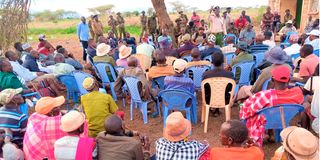NCIC wants more women involved in peacebuilding

Isiolo County Commissioner Geoffrey Omoding addresses elders from Ameru, Borana, Turkana, Somali and Samburu communities during a security meeting in Mlango, Burat ward on December 23, 2022. He closed down two markets due to insecurity along the LMD-Mlango-Oldonyiro road.
What you need to know:
- The agency, in partnership with Isiolo Peace Link, is training 70 women leaders from the county in peacebuilding and mediation to strengthen women’s role in conflict prevention and resolution.
- The programme, supported by the UNDP and Peace Building Fund, is also undertaken in Marsabit, Garissa, Kisumu, Nairobi and some of the Western counties and covers early warning reporting.
The National Cohesion and Integration Commission (NCIC) has rooted for increased women participation in peacebuilding and conflict resolution even as traditions continue to limit their involvement.
The agency, in partnership with Isiolo Peace Link, is currently training 70 women leaders from the county on peacebuilding and mediation as part of its efforts to strengthen women’s role in conflict prevention and resolution.
The programme, supported by the United Nations Development Programme and Peace Building Fund, is also being undertaken in Marsabit, Garissa, Kisumu, Nairobi and some of the Western counties and covers early warning reporting.
Also read: Drought: Turkana women on cross border peace mission
Mr Richard Nderitu, NCIC principal planning, monitoring and evaluation officer, said the initiative is part of their effort to ensure a multidimensional approach to conflict and peacebuilding where all crucial actors are integrated into the processes.
“For sustainable peace to be achieved, all the actors, including women, must be brought on board. Our selection of the county was due to its perennial conflicts,” he said.
Decision-making
Mr Nderitu lamented that women in pastoralist areas, who suffer most during conflicts, are rarely involved in formal decision-making where peace resolutions are made.
Pastoral women are perceived to lack crucial skills, knowledge and societal standing required of decision-makers, making it hard to tap into their peacebuilding potential.
County Trade Chief Officer Lucy Kaburu called for the empowerment of women leaders to participate in peacebuilding.
“Women bear the brunt of conflicts, hence involvement in peacebuilding and mediation should not be on their perceived gender roles but their convincing ability. Naturally, they are peace advocates and mediators,” she said during a session in Isiolo town.
The county, Ms Kaburu said, is keen on economically empowering women and tackling their plight.
Ms Lydia Ntinyari and Ms Halima Doyo, who are members of the indigenous women of the UN Resolution 1325 action group, said allowing increased women participation in key community matters would ensure their interests are well taken care of when decisions are made.
Ms Ntinyari said while women are on the frontline of preaching peace, patriarchy limits their participation, especially at the decision-making table. “Few are members of the local peace committees and the voice of those picked rarely counts.
There is a need for sustained sensitisation to change the narrative and ensure equal participation,” she said, adding that men and women should be equal partners on peace matters.
Isiolo’s Samburu Council of Elders chairperson Joyce Nairesiae lamented that despite her key post, she is rarely involved by male elders on crucial matters such as peace initiatives and resolutions.
“It is time we discarded the outdated traditions and embraced change. Men should surrender the illegal firearms and let women take over the herding. We will graze and eat together and we cannot fight each other. We are known for creating ties so fast.”
Isiolo Peace Link director Abdia Mohammud said women from the county will also take part in peace campaigns on local radio stations.





